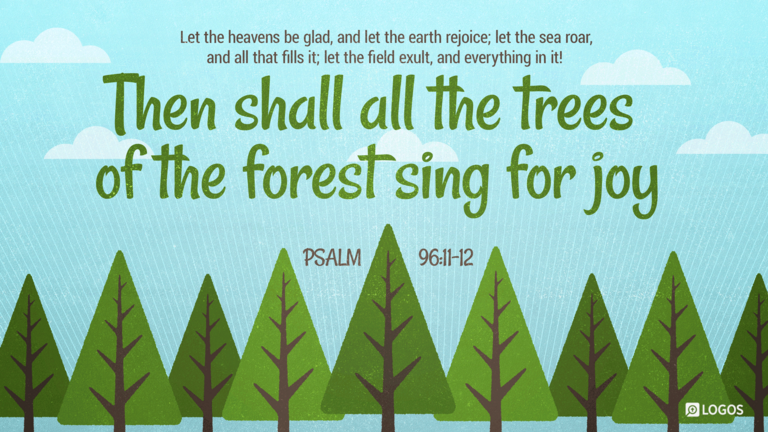Verse 11. Let the heavens rejoice] The publication of the Gospel is here represented as a universal blessing; the heavens, the earth, the sea, and its inhabitants, the field, the grass, and the trees of the wood, are all called to rejoice at this glorious event. This verse is well and harmoniously translated in the old Psalter:—
Fayne be hevenes,—and the erth glad;
Styrde be the see,—and the fulnes of it;
Joy sal feldes,—and al that ere in thaim.
And the paraphrase is at least curious:—
Hevens, haly men. Erthe, meke men that receyves lare (learning.) Feldes, that is even men, mylde and softe: they shall joy in Criste. And all that is in thaim, that es, strengh, wyttes & skill.”
I shall give the remaining part of this ancient paraphrase, which is an echo of the opinion of most of the Latin fathers.
Verse 12. Thou sal glad al the trese of woddes.—Thou, that is in another lyfe. Trese of woddes.—Synful men that were fyrst withouten frut, and sithen taken into God’s temple.
Verse 13. For he coms, he coms. He coms, fyrste to be man.—Sythen he comes to dome the erth.
He sal deme in evenes the erth:—and folk in his sothfastnes. Nothing is evener, or sothfaster, than that he geder with hym perfyte men; to dome and to deperte to the rig hande (thaim) that did mercy:—pase to the lefte hande (thaim) that did it nogt.
The psalmist here in the true spirit of poetry, gives life and intelligence to universal nature, producing them all as exulting in the reign of the Messiah, and the happiness which should take place in the earth when the Gospel should be universally preached. These predictions seem to be on the eve of complete fulfilment. Lord, hasten the time! For a fuller explanation see the following analysis.
Adam Clarke, The Holy Bible with a Commentary and Critical Notes, New Edition., vol. 3 (Bellingham, WA: Faithlife Corporation, 2014), 525–526.


